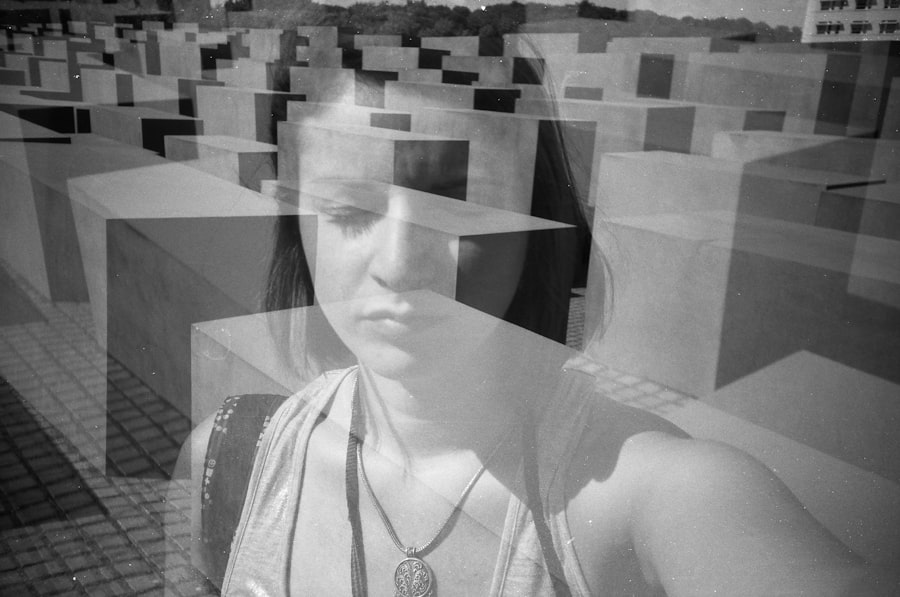Depersonalization and derealization are complex psychological phenomena that can leave you feeling detached from yourself or your surroundings. When you experience depersonalization, you may feel as though you are an observer of your own life, as if you are watching yourself from a distance. This sensation can be disorienting and unsettling, often leading to feelings of confusion and anxiety.
On the other hand, derealization involves a sense of unreality regarding your environment. You might perceive the world around you as strange or dreamlike, making it difficult to connect with your surroundings. Both experiences can occur independently or together, and they often arise in response to stress, trauma, or overwhelming emotions.
Understanding these phenomena is crucial for anyone who has experienced them. They are not uncommon, especially in high-stress situations or during periods of significant emotional upheaval. While they can be alarming, it’s important to recognize that they are often temporary and can be managed with the right strategies.
By gaining insight into what depersonalization and derealization entail, you can begin to navigate your experiences more effectively and seek appropriate support when needed.
Key Takeaways
- Depersonalization and derealization are dissociative disorders that can make individuals feel detached from themselves and their surroundings.
- Symptoms of depersonalization and derealization include feeling like an outside observer of one’s thoughts and actions, and experiencing a sense of unreality or detachment from the environment.
- Coping strategies for depersonalization and derealization include grounding techniques, mindfulness practices, and seeking professional help.
- Seeking professional help for depersonalization and derealization may involve therapy, medication, and other treatment options tailored to the individual’s needs.
- Self-care techniques for managing depersonalization and derealization include maintaining a healthy lifestyle, practicing stress-reducing activities, and seeking social support from friends and family.
Recognizing Symptoms of Depersonalization and Derealization
Recognizing the symptoms of depersonalization and derealization is the first step toward addressing these experiences. You may find yourself feeling disconnected from your thoughts, emotions, or sense of identity. This disconnection can manifest as a feeling of being robotic or emotionally numb, where you struggle to engage with your feelings or the world around you.
You might also notice that your perception of time becomes distorted; moments may feel elongated or fleeting, contributing to a sense of confusion about your reality. In addition to these internal experiences, derealization can lead to external symptoms that affect how you perceive your environment. You may feel as though the world is foggy or unreal, as if you are living in a dream.
Colors may seem muted, sounds may feel distant, and familiar places may appear foreign. These sensations can be distressing and may lead to increased anxiety or panic attacks. By identifying these symptoms early on, you can take proactive steps to manage them and reduce their impact on your daily life.
Coping Strategies for Depersonalization and Derealization

When faced with depersonalization and derealization, implementing effective coping strategies can make a significant difference in how you manage these experiences. One approach is grounding techniques, which help anchor you in the present moment. You might try focusing on your physical sensations—feeling the texture of an object in your hand or noticing the temperature of the air against your skin.
Engaging your senses can help bridge the gap between your internal experience and the external world, fostering a sense of connection. Another useful strategy is mindfulness meditation.
This practice encourages you to observe your experiences rather than becoming overwhelmed by them. You might find it helpful to set aside a few minutes each day for mindfulness exercises, allowing yourself to breathe deeply and focus on the present moment. Over time, these techniques can help reduce the intensity of depersonalization and derealization episodes, providing you with tools to navigate challenging moments more effectively.
Seeking Professional Help for Depersonalization and Derealization
| Year | Number of People Seeking Professional Help | Percentage Increase from Previous Year |
|---|---|---|
| 2015 | 500 | N/A |
| 2016 | 750 | 50% |
| 2017 | 1000 | 33.3% |
| 2018 | 1200 | 20% |
| 2019 | 1500 | 25% |
If you find that depersonalization and derealization are significantly impacting your life, seeking professional help is a vital step toward recovery. Mental health professionals can provide valuable insights into your experiences and offer tailored treatment options. Therapy modalities such as cognitive-behavioral therapy (CBT) have been shown to be effective in addressing these symptoms by helping you reframe negative thought patterns and develop healthier coping mechanisms.
In some cases, medication may also be recommended to help manage underlying anxiety or depression that could be contributing to your experiences of depersonalization and derealization. A psychiatrist can work with you to determine if medication is appropriate for your situation and monitor its effects over time. Remember that seeking help is a sign of strength; it demonstrates your commitment to understanding yourself better and improving your mental well-being.
Self-Care Techniques for Managing Depersonalization and Derealization
Incorporating self-care techniques into your daily routine can play a crucial role in managing depersonalization and derealization. Prioritizing self-care means recognizing your needs and taking steps to nurture your mental and emotional health. One effective self-care practice is maintaining a consistent sleep schedule.
Quality sleep is essential for overall well-being, and establishing a regular sleep routine can help reduce feelings of disconnection. Additionally, engaging in physical activity can be beneficial for both your body and mind. Exercise releases endorphins, which can improve mood and reduce anxiety levels.
Whether it’s going for a walk, practicing yoga, or participating in a favorite sport, finding an activity that you enjoy can provide a sense of accomplishment and connection to your body. By integrating self-care practices into your life, you create a supportive environment that fosters resilience against depersonalization and derealization.
Lifestyle Changes to Reduce Depersonalization and Derealization

Making lifestyle changes can significantly impact your experiences with depersonalization and derealization. One important change is reducing stressors in your life. This might involve setting boundaries at work or learning to say no to commitments that overwhelm you.
By prioritizing your mental health, you create space for relaxation and self-reflection. Another lifestyle adjustment involves evaluating your diet and nutrition. A balanced diet rich in whole foods can positively influence your mood and energy levels.
Consider incorporating more fruits, vegetables, whole grains, and lean proteins into your meals while minimizing processed foods high in sugar and unhealthy fats. Staying hydrated is equally important; dehydration can exacerbate feelings of anxiety and disconnection. By making conscious choices about what you consume, you empower yourself to take control of your mental health.
Support Systems for Coping with Depersonalization and Derealization
Building a strong support system is essential when navigating the challenges of depersonalization and derealization. Surrounding yourself with understanding friends and family members who are willing to listen can provide comfort during difficult times. Sharing your experiences with trusted individuals allows you to feel less isolated in your struggles; it fosters connection and understanding.
In addition to personal relationships, consider joining support groups where individuals share similar experiences. These groups offer a safe space for discussing feelings of depersonalization and derealization without fear of judgment. Connecting with others who understand what you’re going through can be incredibly validating and empowering.
Whether online or in-person, support systems play a crucial role in helping you cope with these experiences.
Tips for Preventing Future Panic Attacks and Depersonalization Derealization
Preventing future panic attacks and episodes of depersonalization or derealization involves proactive measures that prioritize mental health stability. One effective strategy is developing a personalized coping plan that outlines specific techniques you can use when you start feeling overwhelmed. This plan might include grounding exercises, breathing techniques, or even a list of supportive contacts you can reach out to during difficult moments.
Additionally, practicing regular stress management techniques is vital for maintaining emotional balance. Engaging in activities that bring you joy—whether it’s pursuing hobbies, spending time in nature, or practicing relaxation techniques—can help reduce overall stress levels. By cultivating resilience through these practices, you empower yourself to face challenges head-on while minimizing the likelihood of future episodes of depersonalization or derealization.
In conclusion, understanding depersonalization and derealization is the first step toward managing these complex experiences effectively. By recognizing symptoms, implementing coping strategies, seeking professional help when necessary, prioritizing self-care, making lifestyle changes, building support systems, and taking proactive measures to prevent future episodes, you can navigate these challenges with greater confidence and resilience. Remember that you are not alone in this journey; support is available, and there are effective strategies to help you reclaim a sense of connection with yourself and the world around you.
Experiencing depersonalization and derealization after a panic attack can be a disorienting and unsettling experience. These symptoms often manifest as a feeling of being detached from one’s body or surroundings, making the world seem unreal. For those seeking more information on this topic, an insightful article can be found on Unplugged Psych, which delves into the psychological mechanisms behind these experiences and offers coping strategies. You can read more about it by visiting this com/’>link.
Understanding these symptoms is crucial for managing them effectively and regaining a sense of normalcy.
LEARN MORE About Depersonalization & Derealization
FAQs
What is depersonalization-derealization disorder?
Depersonalization-derealization disorder is a mental health condition characterized by feeling detached from oneself (depersonalization) and feeling detached from the world around them (derealization). These feelings can be persistent and cause significant distress or impairment in daily functioning.
What are the symptoms of depersonalization-derealization disorder?
Symptoms of depersonalization-derealization disorder may include feeling like an outside observer of one’s thoughts, feelings, and body (depersonalization), feeling like the world is unreal or distorted (derealization), emotional numbness, and a sense of detachment from one’s surroundings.
What causes depersonalization-derealization disorder?
The exact cause of depersonalization-derealization disorder is not fully understood, but it is believed to be related to a combination of biological, psychological, and environmental factors. It is often associated with trauma, stress, anxiety, and panic attacks.
How is depersonalization-derealization disorder diagnosed?
Diagnosis of depersonalization-derealization disorder is typically based on a thorough psychiatric evaluation, including a discussion of symptoms, medical history, and ruling out other potential causes. There are no specific tests for this disorder, so diagnosis is based on clinical judgment.
What are the treatment options for depersonalization-derealization disorder?
Treatment for depersonalization-derealization disorder may include psychotherapy, such as cognitive-behavioral therapy (CBT) or dialectical behavior therapy (DBT), medication, and stress management techniques. It is important for individuals to work with a mental health professional to develop a personalized treatment plan.
Can depersonalization-derealization disorder occur after a panic attack?
Yes, depersonalization-derealization disorder can occur after a panic attack. It is not uncommon for individuals who experience severe anxiety or panic attacks to also experience symptoms of depersonalization and derealization. This can be distressing, but with appropriate treatment, symptoms can improve.




